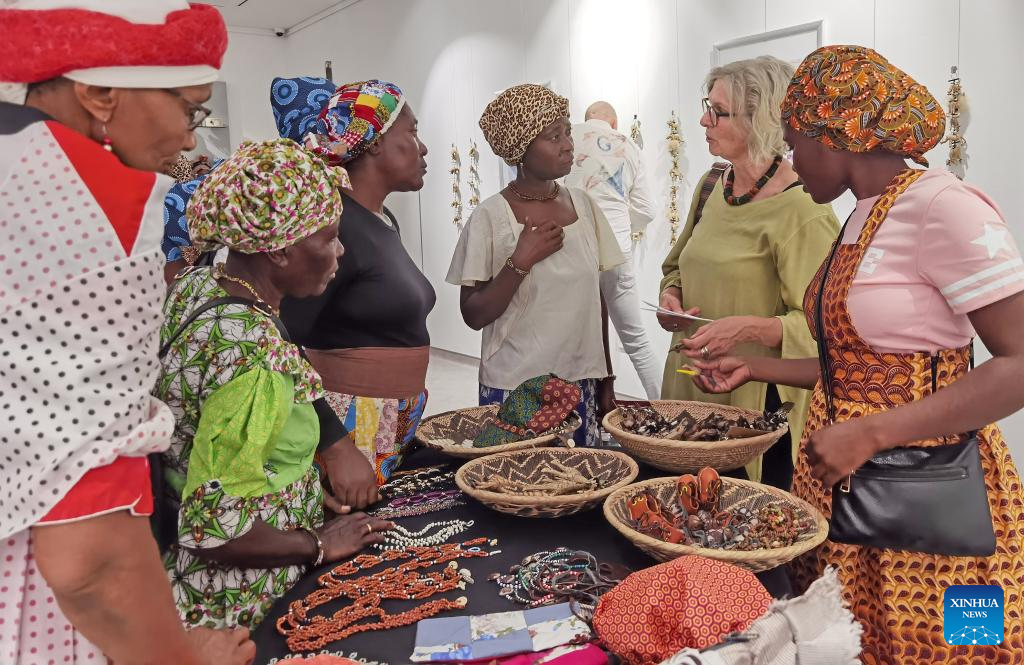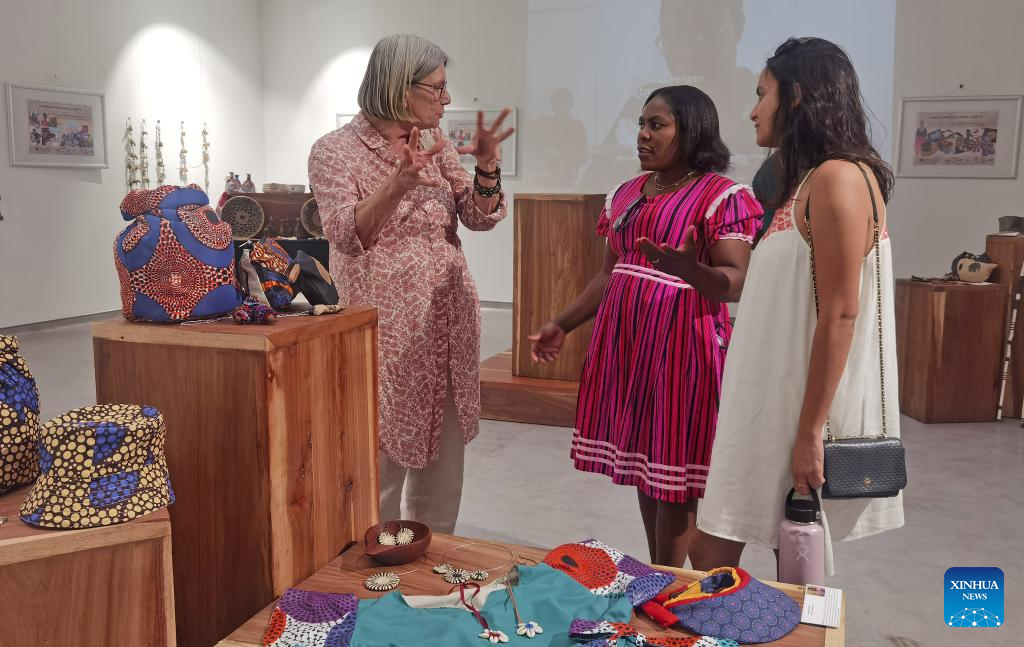
People visit an exhibition at a local gallery in the Namibian capital of Windhoek, Oct. 4, 2023. (Photo by Ndalimpinga Iita/Xinhua)
WINDHOEK, Oct. 5 (Xinhua) -- In a display of creativity at a local gallery in the Namibian capital of Windhoek, artist Eliphas Areseb from Twyfelfontein in the Erongo region skillfully transformed a palm tree fruit nut into a beautifully decorated keyholder. This live demonstration offered visitors a firsthand glimpse into the intricate craft that formed part of an exhibition opening on Thursday evening.
The exhibition, titled "Ombonde-Hoanib Landscape," showcases local artworks and represents the latest endeavor to spotlight art created under the Biodiversity Economy initiative, focusing on the Ombonde-Hoanib landscape of conservation areas in the Erongo and Kunene regions.
The Ombonde-Hoanib People's Landscape is a joint initiative aimed at connecting core conservation areas across about 40 conservancies spanning 78,000 square kilometers. This vast area boasts remarkable tourist attractions, including Twyfelfontein, Namibia's first world heritage site.
Bennet Kahuure, director of wildlife and national parks in the Ministry of Environment, Forestry and Tourism, said the project, implemented in partnership with the Namibian Craft Centre and the Community Skills Development Foundation since 2022, has empowered 12 community members from diverse ethnic backgrounds, including Damara and Herero, in various traditional craft techniques, placing a strong emphasis on sustainable development.
Kahuure highlighted the vital role that communities within conservation areas play in preserving Namibia's wildlife and natural heritage. However, he noted that they often do not reap the benefits of the tourism sector. "This project intertwines environmental conservation with community development to uplift impoverished communities by providing new economic opportunities in the tourism sector," he said.
According to local research firm Simonis Storm Securities, the local tourism industry contributes about 32 billion Namibian dollars (about 2 billion U.S. dollars) to Namibia's economy. As Namibia's landscapes continue to attract visitors, the artists involved in this initiative are optimistic that it will propel their endeavors to new heights.
For over a decade, Areseb has crafted artistic items from palm tree nuts and hats, typically selling them to agents in the cultural tourism sector, who would, in turn, offer them to international visitors. "But through this initiative, I have learned new marketing techniques that enable me to create my own market space, set better prices, and explore other options, such as partnerships with art shops across the country, which were previously unavailable to me," he said.
Chiron Byl, who comes from Spitzkoppe in the Erongo region, draws inspiration from the Damara and Herero heritage to create unique jewelry using materials from her environment. Since her involvement in the Biodiversity Economy initiative, she has expanded her craft to include printing T-shirts featuring local wildlife and cultural elements, marking a significant breakthrough for her.
"In fact, this is my first time exhibiting my work at a national level, which demonstrates the transformative power of ecotourism for local communities while showcasing Namibia's rich culture through this training," she said.
Shareen Thude, the manager of the Namibia Craft Center, said the project aims to have a positive impact on locals through further skills exchange programs and the exploration of new markets for products. It ventures off the beaten path to attract national and international visitors.
"This approach provides them with opportunities for steady income generation while preserving their cultural roots and passing on their skills to others. It's the way we create sustainability," she said. ■

People visit an exhibition at a local gallery in the Namibian capital of Windhoek, Oct. 4, 2023. (Photo by Ndalimpinga Iita/Xinhua)
